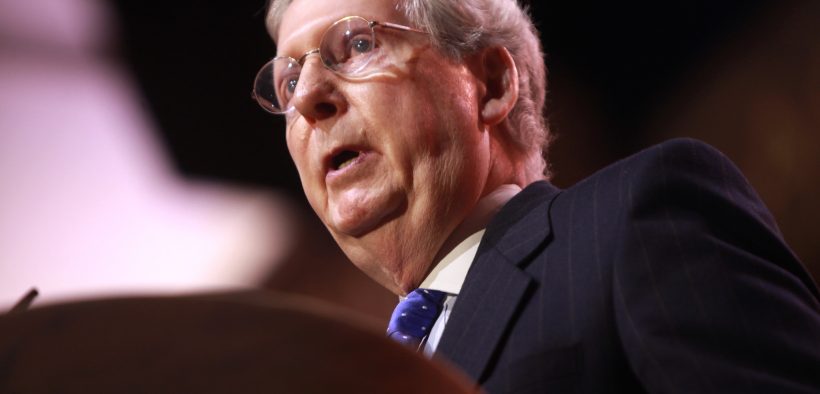McConnell Advances 13 Lifetime Trump Judges In Rapid-Fire Confirmations

“Senators must put an end to this blatant disrespect to our judicial system, traditions, and democracy. They must demand that each nomination receives a roll call vote, so the public knows where their senators stand.”
The Senate confirmed 13 lifetime judicial nominees this week, entrenching what may be the most enduring legacy of the Trump administration: the conservative transformation of the nation’s courts.
“We’re going to continue to move these nominations forward,” McConnell said before the votes. “For too long, fairly uncontroversial judicial nominees just like these have been held up and delayed by our Democratic colleagues.”
Progressives criticized McConnell’s statements as hypocritical, as the Senate Majority Leader was notoriously obstructive during President Obama’s tenure and has changed the rules of his chamber to enable the rapid-fire confirmations.
From 2009 to 2013, McConnell led the senate in blocking 79 Obama nominees. In every presidential administration in US history until that point, only 68 presidential nominees had been blocked. McConnell famously denied President Obama’s Supreme Court pick Merrick Garland a confirmation hearing, leaving a vacancy in the country’s highest court for over a year.
“McConnell confirmed only 18 Obama district judges in two years. Now, he wants to confirm 19 Trump district judges in one week,” tweeted Christopher Kang, chief counsel for progressive advocacy group Demand Justice. “This is only possible because Republicans went nuclear and changed the Senate rules.”
Criticism Of The Judicial Restructuring
Kristine Lucius of the Leadership Conference, a civil rights group, spoke to MSNBC on Wednesday about McConnell’s move to load the judiciary with Trump nominees. Lucius used the current case to potentially strike down the Affordable Care Act as an example of the long-term consequences the lifetime court confirmations will have.
“That case pending right now in the fifth circuit is a real education moment for voters to understand the impact of the courts,” said Lucius. “Trump is trying to do right now through the courts what he was not able to do through legislation.”
Lucius was among the numerous activists who criticized the senate for allowing McConnell to advance the nominees without fighting for a more rigorous vetting process.
Nearly all of Trump’s appointees are backed by the Koch-funded Federalist Society, and numerous nominees are inexperienced and have been accused of discrimination. As Christopher Kang pointed out, eleven of Trump’s most recent picks refused to endorse Brown v. Board of Education, the 1954 Supreme Court decision that ruled school segregation as unconstitutional.
“The senate is supposed to be acting as a backstop to protect our independent and fair judiciary,” said Lucius.
McConnell’s Double Standard
In 2013, McConnell’s obstructions of Obama appointees motivated then-Senate Majority Leader Harry Reid to use the “nuclear option,” a controversial loophole that allows the senate to override the 60-vote rule. McConnell ominously warned Democrats, “you may regret this a lot sooner than you think.”
After blocking Merrick Garland, McConnell used the nuclear option in 2017 to eliminate the filibuster for Supreme Court nominees, filling the vacancy with Trump pick Judge Neil M. Gorsuch. Later, McConnell pledged to “plow right through” Brett Kavanaugh’s confirmation process despite credible allegations of sexual assault, appointing the second successful Supreme Court pick of the Trump administration.
McConnell continued to use the nuclear option a second time in April 2019, slashing the time Democrats could delay confirmation processes from 30 hours to 2 hours. McConnell also gutted “blue slips”, a process that allows Senators to object to nominees in their state.
Sen. Patrick Leahy, former chairman of the Senate Judiciary Committee, slammed McConnell’s decision to use the nuclear option to bypass senate scrutiny of the appointees:
“It is motivated by the far-right’s desire to flood the federal judiciary with young, ideological nominees, many of whom- as we have seen time and again in the Judiciary Committee- are simply unqualified to serve on our nation’s courts.”












The USA provides an outstanding example of very unrepresentative government. Maybe it’s a “lesser of two evils” situation. Or maybe not.
3 of the judges are Democrats chosen by Democratic senators in deals with the GOP.
In fact, some of Trump’s judicial nominees were also nominated by Obama.